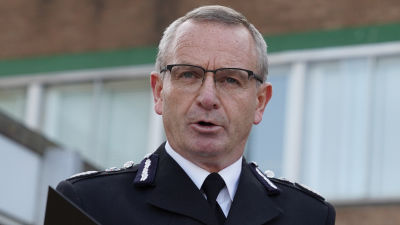By David Young-
An admission by Scotland’s chief constable that the force is “institutionally racist and discriminatory” is the first step in addressing the endemic problem
Sir Iain Livingstone, who is set to retire later this year, said prejudice and bad behaviour within policing was “rightly of great concern and is utterly condemned”.
Expressing a determination to confront such racism at a meeting of the Scottish Police Authority on Thursday morning, Sir Iain said the right thing to do as chief constable is to “clearly state that institutional racism, sexism, misogyny and discrimination exist”.
He added: “Police Scotland is institutionally racist and discriminatory.
“Publicly acknowledging these institutional issues exist is essential to our absolute commitment to championing equality and becoming an anti-racist service.
“It is also critical to our determination to lead wider change in society.
“Prejudice and bad behaviour within policing, as highlighted by court and conduct cases, various independent reviews and by listening to our own officers and staff over recent years, is rightly of great concern and is utterly condemned.”
Sir Iain stressed that his admission did not mean that individual officers or staff were racist or sexist.
He said: “I have great confidence in the character and values of our people. I am proud of Police Scotland and I am proud of my colleagues, proud of my officers and staff.
“So I know and have shared the reservations and concerns about acknowledging that institutional discrimination exists in policing.”
Sir Iain, who has been an officer for three decades and held the position of chief constable for six years, admitted that people from different backgrounds or with different requirements “don’t always get the service that is their right”.
He said that was also true for the force’s own officers and staff.
Sir Iain said there “is no place” in Police Scotland for those who reject the force’s values and standards, noting there has been “rigorous recruitment; enhanced vetting; more visible conduct outcomes; and a focus on prevention”.
The chief constable also put the “onus” on the force to rid itself of institutional racism.
Sir Iain said: “A candid, clear assessment of institutional discrimination means recognising our absolute duty to provide just and effective policing for all according to their specific needs and circumstances.
“It also requires identifying and removing the deep-rooted barriers to achieving this.
“These are necessary steps to progress the commitment that Police Scotland will be anti-racist; a personal commitment I made to my fellow citizens at the commencement of the public inquiry into the death of Sheku Bayoh. And, as a commitment to the people of Scotland, it is also a commitment to Sheku Bayoh’s family and loved ones.
“The onus is on us, the police service, to address gaps and challenge bias, known or unwitting, at every level, wherever bias occurs, to maintain and build confidence with all communities.”
Sir Iain added that understanding and recognising institutional racism and discrimination will help lead the “necessary change” in the force and “contribute to change across society”.
He said that Scotland as a whole must join the mission to “eradicate discrimination”.
Sir Iain added: “The police service of Scotland is committed [to] that mission, committed to ensuring our police service, your police service and institutions are, together with the people of Scotland, building fairness, equality and justice.”
At First Minister’s Questions later on Thursday, Humza Yousaf commended Sir Iain for his statement.
He said: “That is the first step that is required in order to then dismantle those institutional and structural barriers that exist.”
Mr Yousaf added: “As a person of colour, the statement from the chief constable is monumental, historic.”
Livingstone’s acknowledgement that the police force is institutionally racist is a significant and crucial statement. By acknowledging this deeply rooted issue, Livingstone demonstrates a willingness to confront and address the systemic racism within the police force, setting the stage for necessary changes and reforms.
Recognizing institutional racism is an important step toward fostering accountability and promoting equality within law enforcement agencies. It acknowledges that systemic biases can permeate all levels of the institution, affecting policies, practices, and interactions with communities.
Livingstone’s statement reflects a commitment to understanding the experiences of marginalized communities and working towards a fairer and more just police force.
A senior police office from South London anonymously told The Eye Of Media.Com: ”This acknowledgement can serve as a catalyst for internal reflection, leading to increased efforts to address biases, improve training, and promote diversity and inclusion within the police force.
”It sends a powerful message to officers, highlighting the importance of cultural competency, sensitivity, and unbiased decision-making in their interactions with the public.
Livingstone’s statement also provides validation and support to those who have experienced racial bias or discrimination at the hands of the police. It signals a commitment to listen, learn, and work towards rectifying past injustices”
Solicitor, Fabian Nworah said: Livingstone’s acknowledgment of institutional racism within Scotland’s police force is an important milestone in the ongoing struggle for police reform and the pursuit of a more equitable and inclusive society. It lays the foundation for meaningful change, fostering trust and confidence between the police and the communities they serve.
User
say more please, and include its relevance to the established fact Met is institutionally racist
ChatGPT
I apologize for any confus




